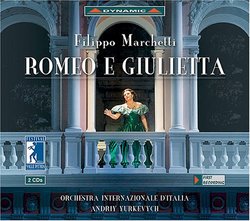| All Artists: Dario Solari, Mario Cassi, Filippo Marchetti, Andriy Yurkevych, Tiziana Portoghese, Italian International Orchestra, Serena Daolio, Giovanni Coletta, Roberto Iuliano Title: Marchetti: Romeo e Giulietta Members Wishing: 0 Total Copies: 0 Label: Dynamic Italy Original Release Date: 1/1/2006 Re-Release Date: 6/27/2006 Album Type: Import Genre: Classical Style: Opera & Classical Vocal Number of Discs: 2 SwapaCD Credits: 2 UPCs: 675754919320, 8007144605025 |
Search - Dario Solari, Mario Cassi, Filippo Marchetti :: Marchetti: Romeo e Giulietta
 | Dario Solari, Mario Cassi, Filippo Marchetti Marchetti: Romeo e Giulietta Genre: Classical
|
Larger Image |
CD Details |
CD ReviewsThe Other Romeo and Juliette... B. Cathey | Wendell, NC United States | 09/21/2006 (4 out of 5 stars) "Filippo Marchetti's ROMEO E GIULIETTA was premiered in Trieste in 1865, two years before Gounod's more famous opera of the same name, and after a run of performances for about eleven years, disappeared from the boards--and that is sad, for Marchetti's opera is quite beautiful and quite moving at times, and deserves to be heard. Marchetti, of course, is better known for his masterpiece, RUY BLAS, which was performed throughout the last forty years of the 19th century, and into the 20th. It was said that composer Antonio Gomes was "Verdi's son," but I think Marchetti could easily be seen in that light. Even so, his music, while reminiscent at times of middle period Verdi, also is quite refined and soft-grained, and shows the influence of Meyerbeer and a familiarity with French composition. His ROMEO is worthy of revival, and, in my opinion, compares favorably with Gounod's work. This performance, recorded live at the Festival della Valle d'Itria of Martina Franca, Italy, in 2005, is strongly cast with young Italian artists, who, on the whole make a strong case for the work. Soprano Serena Daolio is fine as Guilietta, as is, for the most part her Romeo, Roberto Iuliano. They both really excel in the moving Act IV, where Marchetti's writing truly reaches a high level. I've played this act for friends who have been likewise struck by its beauty and intense feeling. I rather like the Fra Lorenzo, Emil Zhelev (although he has not gotten good reviews elsewhere). The other cast members are also good. The Orchestra Internazionale d'Italia and the Bratislava Chamber Choir perform extremely well, under Andriy Yurkevych. Both of Marchetti's major operatic works now have good recordings, and opera lovers are much better off for it. Highly recommended." Much better than one might expect John Cragg | Delta(greater Vancouver), B.C Canada | 11/21/2008 (4 out of 5 stars) "You can't get much more obscure than Marchetti. Not only is his work not much performed, it is also the case that most reference works seem to pass him over with a few rather uncomplimentary remarks. So it is a delight to find out how good much of this opera is. It is clearly derivative in some places of Verdi and more generally of romantic music and it is also heading quite clearly towards Verismo in much of the music -- and better at it than some better known works in that genre. Some of the writing is decidedly hackneyed. But most of it rises to a higher level, both expressing emotions well and giving substantial opportunity for really lovely singing.
The performance recorded here is well cast with the Romeo and Giulietta both first class singers of whom one wants to hear more. They are particularly good in the final act. The other roles are well handled and the chorus and orchestra do a splendid job, the latter especially bringing out that Marchetti was not just a hack writer of accompaniment. The conducting by Andriv Yurkevych is indeed first rate, so that the whole comes together better than might be expected from some rather diverse parts. The weakness of the set is in the recording production. Especially at the beginning, the miking of the chorus and principals is rather haphazard, with the orchestra too much to the fore and the singers sometimes -- but not always -- sounding as if they were singing through a fog -- and at its worst as if they are being heard from the lobby of the theatre. This weakness largely disappears by the second half of the opera, but then the final act is marred by far too prominent stage noises. Except for these minor disappointments, this proves to be a very worthwhile set." |

 Track Listings (18) - Disc #1
Track Listings (18) - Disc #1